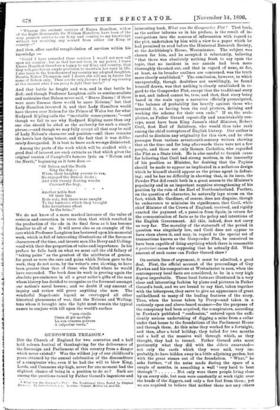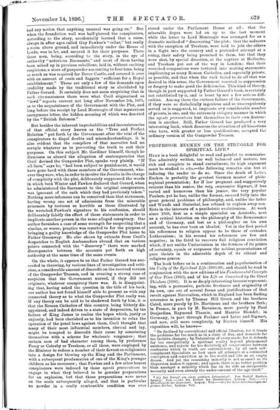GUNPOWDER TREASON.*
DID the Church of England for two centuries and a half hold solemn festival of thanksgiving for the deliverance of the Sovereign and Parliament of this country from a danger which never existed ? Was the wildest joy of our childhood's years obtained by the annual celebration of the discomfiture of a conspirator who, even if he had the will to blow King, Lords, and Commons sky-high, never for one moment had the slightest chance of being in a position to do so ? Such are among the questions raised by Father Gerard's ingenious and • What vas the GunpotrOrr Plot' The Traditional Story Tested hg Original Evidshre. By John th:rard, o J. Leaden: Osgood, MclIva us, and Co.
interesting book, What was the Gunpowder Plot ? That book, as the author informs us in his preface, is the result of in- vestigations into the sources of information with regard to the plot, undertaken by him with a view to a paper which he had promised to read before the Historical Research Society, at the Archbishop's House, Westminster. The subject was chosen for him, and he accepted it reluctantly, believing "that there was absolutely nothing fresh to say upon the topic, that no incident in our annals had been more thoroughly threshed out, and that in regard of none, so far, at least, as its broader outlines are concerned, was the truth more clearly established." The conclusion, however, to which unexpectedly, though doubtless not unwillingly, he found himself drawn, was that nothing is clearly established in re- gard to the Gunpowder Plot, except that the traditional story is not, and indeed cannot be, true, and that, that story being based in the main upon a narrative officially promulgated, "the balance of probability lies heavily against those who invented it, as having been the real plotters, devising and working the scheme for their own ends." If so, the arch- plotter, as Father Gerard repeatedly and unmistakably con- veys, must have been King James's chief Minister, Robert Cecil, first Earl of Salisbury, who would thus take rank among the chief corrupters of English history. Our author is careful to disclaim any originality for this view, and he cites passages from various seventeenth-century writers showing that at the time and for long afterwards there were not a few people, and those not only Roman Catholics, who regarded the Plot as a State trick. He is also careful to furnish cause for believing that Cecil had strong motives, in the insecurity of his position as Minister, for desiring that the Papists should be made to appear as implicated in a nefarious design which he himself should appear as the prime agent in defeat- ing; and he has no difficulty in showing that, in its issue, the Powder Plot did result both in a great access to the Minister's popularity and in an important negative strengthening of his position by the ruin of the Earl of Northumberland. Further, on the question of character, he naturally lays stress on the fact, which Mr. Gardiner, of course, does not disguise, though he endeavoms to minimise its significance, that Cecil, while chief Minister of the Crown of England, received, and rigidly exacted the payment of, a pension from Spain, in return for the communication of facts as to the policy and intentions of the English Government. All this, indeed, does not carry us very far. The morality of the statecraft of the period in question was singularly low, and Cecil does not appear to have risen above it, and may, in regard to the special set of transactions known as the Gunpowder Plot, be conceived to have been capable of doing anything which there is reasonable a. posteriori cause for supposing that he actually did. What amount of such cause can Father Gerard show ?
On certain lines of argument, it must be admitted, a good deal. First, the official account of the proceedings of Guy Fawkes and his companions at Westminster is seen, when the contemporary local facts are considered, to be in a very high degree improbable. Those local facts are illustrated in a very clear and interesting fashion by plans and pictures in Father Gerard's book, and we are bound to say that, taken together with the letterpress, they serve to give an appearance of great unlikelihood to many of the leading features of the story. Thus, when the house taken by Percy—and taken in a curiously open and above-board manner—for the purposes of the conspiracy had been acquired, the conspirators, according to Fawkes's published "confession," entered upon the suffi- ciently serious undertaking of digging a mine from a cellar under that house to the foundations of the Parliament House and through them. At this mine they worked for a fortnight, and then, after a brief holiday, they toiled for two months and a half at the massive wall through which, as they thought, they had to tunnel. Father Gerard asks most pertinently what they did with the clitoris excavated— not only the earth which they were said, very im- probably, to have hidden away in a little adjoining garden, but with the great stones out of the foundation. "What," he asks further, "of the noise made during the space of a couple of months, in assaulting a wall very hard to beat
through ' ? Not only were there people living close by on every side, but men were constantly at work right over the heads of the diggers, and only a few feet from them ; yet we are required to believe that neither these nor any others had any notion that anything unusual was going on." But when the foundation wall was half-pierced the conspirators, according to the story, accidentally learned that a room, always in after ages called Guy Fawkes's "cellar," but really a room above ground, and immediately under the House of Lords, was to let, and secured it for their purposes. There these men, being, according to the story, in the eye of authority "notorious Recusants," and most of them having been mixed up in previous rebellions, laid in, without exciting suspicions, a store of gunpowder amounting to four tons, being as much as was required for Dover Castle, and covered it over with an amount of coals and faggots "sufficient for a Royal establishment." These are only a few of the demands upon credulity made by the traditional story as elucidated by Father Gerard. It certainly does not seem surprising that in such circumstances there were what Cecil stigmatised as "lewd" reports current not long after November 5th, 1605, as to the acquaintance of the Government with the Plot, and long before the receipt by Lord Monteagle of that mysterious anonymous letter, the hidden meaning of which was descried by the "British Solomon."
But besides the inherent improbabilities and inconsistencies of that official story known as the "True and Perfect Relation" put forth by the Government after the trial of the conspirators to dispel doubts and misunderstandings, it is also evident that the compilers of that narrative had no scruple whatever as to perverting the truth to suit their purposes. On this subject Mr. Gardiner himself, though he dismisses as absurd the allegation of contemporaries that Cecil devised the Gunpowder Plot, speaks very plainly. "If all liars," says he, "had been subject to punishment, it would have gone hard with those members of the Government, who- ever they were, who, in order to involve the Jesuits in the charge of complicity with the plot, deliberately suppressed the words in which both Winter and Fawkes declared that Gerard, when he administered the Sacrament to the original conspirators, was ignorant of the oath which they had previously taken." Nothing more infamous can be conceived than that statesmen, having wrung one set of admissions from the miserable prisoners by tortures so horrible as those illustrated by the wretched Fawkee's signature to his confession, should deliberately falsify the effect of those statements in order to implicate another person in the same alleged conspiracy. Our author furnishes a case of some strength for suspecting that a similar, or worse, practice was resorted to for the purpose of bringing a guilty knowledge of the Gunpowder Plot home to Father Greenway. He also shows by extracts from Cecil's despatches to English Ambassadors abroad that on various points connected with the " discovery " there were marked discrepancies between the accounts put forth on high authority at the same time of the same events.
On the whole, it appears to us that Father Gerard has suc- ceeded in throwing, by various lines of investigation and criti- cism, a considerable amount of discredit on the received version of the Gunpowder Treason, and in creating a strong case of suspicion that the Government nursed, if they did not originate, whatever conspiracy there was. It is disappoint- ing that, having asked the question in the title of his book, our author has not found himself able to present us with any connected theory as to what the Gunpowder Plot really was. If any theory can be said to be shadowed forth by him, it is that the Roman Catholics of this country, being bitterly die- appointed, and indeed driven to a state of desperation, by the failure of King James to realise the hopes which, justly or unjustly, had been cherished as to his intention to relax the operation of the penal laws against them, Cecil thought that many of their most influential members, clerical and lay, might be tempted to discredit their cause by associating themselves with a scheme for wholesale vengeance ; that certain men of bad character among them, by preference Percy or Catesby or Tresham, or all three, were employed by the Minister to seduce a number of their devout co-religionists into a design for blowing up the King and the Parliament, with a subsequent proclamation of one of the King's younger children as his successor ; that Fawkes and a few other honest conspirators were induced by these agents provocateurs to engage in what they believed to be genuine preparations for an explosion, but that those preparations were never on the scale subsequently alleged, and that in particular no powder in a really combustible condition was ever stored under the Parliament House at all ; that the miserable dupes were led on up to the last moment while the letter to Lord Monteagle was arranged for as a dramatic method of " discovering " the plot; that the seducers with the exception of Tresham, were told to join the others in a flight into the country and a pretended attempt at a rising, their safety being promised to them, but that they were shot, by special direction, at the capture at Holbeche, and Tresham put out of the way in London ; that their wretched companions were tortured into making statements implicating as many Roman Catholics, and especially priests, as possible, and that when the rack failed to do all that was desired in this sense, the Government resorted to suppression or forgery to make good the deficiencies. This kind of theory, though in part supported by Father Gerard's book, is certainly not established by it, and is beset by not a few serious diffi- culties. Among these the curious failure of the Government, if they were so diabolically ingenious and so unscrupulously served as is suggested, to implicate an y considerable number of priests, is one, and the extremely obliging manner in which the agents provocateurs lent themselves to their own destruc- tion is another. Still, Father Gerard has produced a very interesting book, which deserves the attention of all historians who have, with greater or less qualifications, accepted
ordinary version of the Gunpowder Treason.







































 Previous page
Previous page